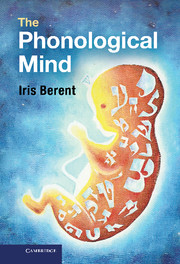Book contents
- Frontmatter
- Contents
- Figures
- Tables
- Copyright acknowledgements
- Preface
- Part I Introduction
- Part II Algebraic phonology
- Part III Universal design
- 6 Phonological universals
- 7 Phonological universals are mirrored in behavior
- 8 Phonological universals are core knowledge
- Part IV Ontogeny, phylogeny, phonological hardware, and technology
- References
- Index
6 - Phonological universals
typological evidence and grammatical explanations
Published online by Cambridge University Press: 05 February 2013
- Frontmatter
- Contents
- Figures
- Tables
- Copyright acknowledgements
- Preface
- Part I Introduction
- Part II Algebraic phonology
- Part III Universal design
- 6 Phonological universals
- 7 Phonological universals are mirrored in behavior
- 8 Phonological universals are core knowledge
- Part IV Ontogeny, phylogeny, phonological hardware, and technology
- References
- Index
Summary
This chapter begins to examine whether the phonological grammar is a system of core knowledge. Core knowledge systems manifest a unique, universal design that features a common set of representational primitives and combinatorial principles. Our question here is whether such design is characteristic of phonological systems. To address this question, I first show that across languages, certain structures are systematically preferred to others. I next demonstrate how such regularities are explained in one influential theory of universal grammar (Optimality Theory) and illustrate how grammatical universals can be reconciled with several challenges, including the diversity of phonological systems and their strong grounding in phonetic constraints. I show that diversity can result from numerous sources, ones that are either internal to the grammar or external – most notably, the phonetic characteristics of the language. Phonetic pressures, however, cannot subsume grammatical phonological principles. Indeed, licit phonological structures are not invariably ones that are phonetically optimal. Moreover, spoken languages share aspects of their design with signed languages despite their dramatic phonetic differences. I conclude that the linguistic evidence is amply consistent with the possibility that grammatical universals form part of the phonological mind. The next chapters proceed to test this hypothesis.
The previous chapters have demonstrated that the phonological grammar is an algebraic system – a system that encodes equivalence classes, represents their relations, and generalizes them across the board. While this algebraic machinery is quite powerful, it is not unique to phonology. Humans (and nonhuman species) exhibit broad algebraic generalizations in many areas, including the representation of number, navigation, and logical inferences. Although each such domain manifests distinct knowledge, these different “programs” all run on algebraic machinery. Accordingly, merely possessing algebraic machinery does not account for the various idiosyncratic properties of phonological systems outlined in Chapter 2. Algebraic machinery alone does not explain why every human language manifests a phonological system, why distinct phonological systems exhibit a common design, and why some design features are shared across modalities – spoken and signed. Algebraic machinery also cannot account for the spontaneous emergence of phonological systems in home signs and the Al-Sayyid Bedouin sign systems, nor does it explain why the properties of such systems differ from other means of auditory communication – human and nonhuman alike.
Information
- Type
- Chapter
- Information
- The Phonological Mind , pp. 117 - 148Publisher: Cambridge University PressPrint publication year: 2013
